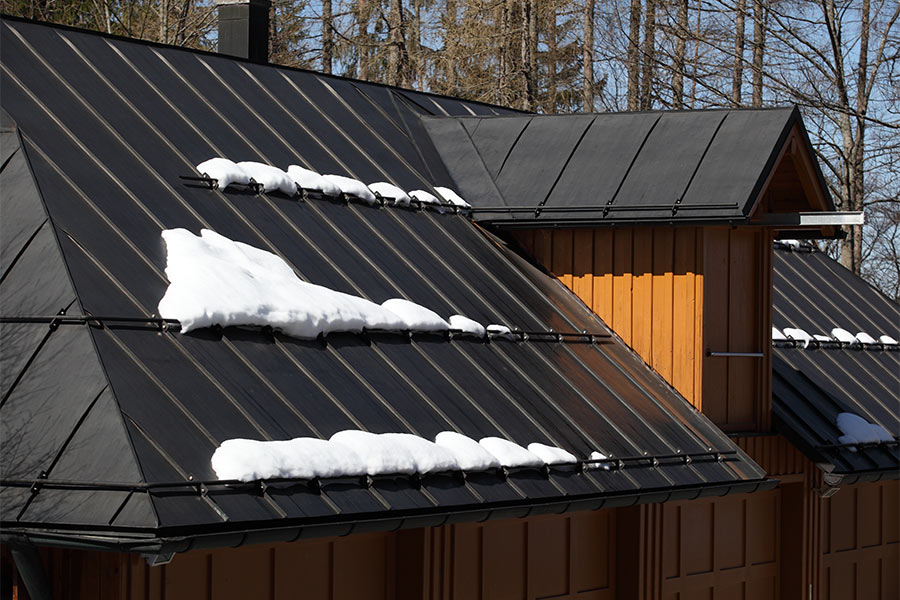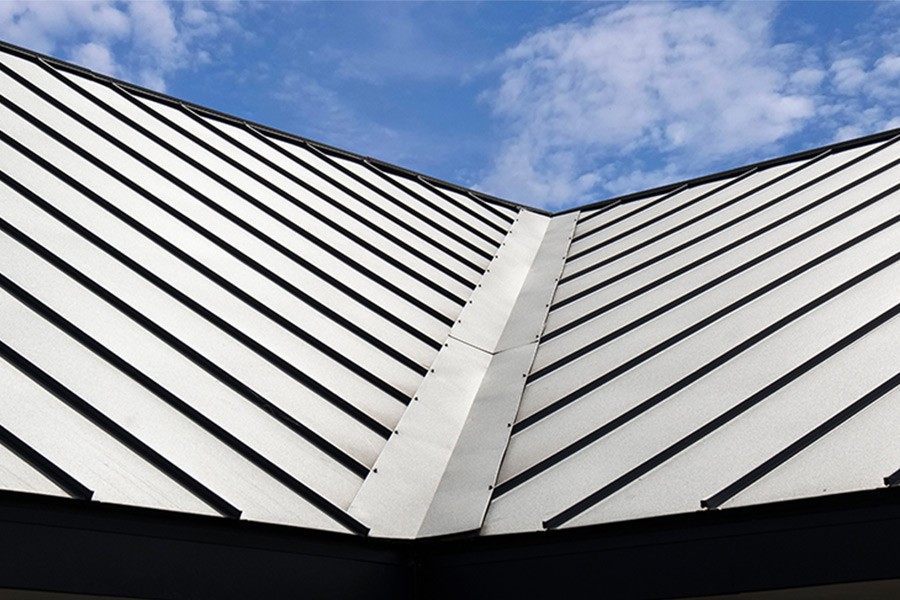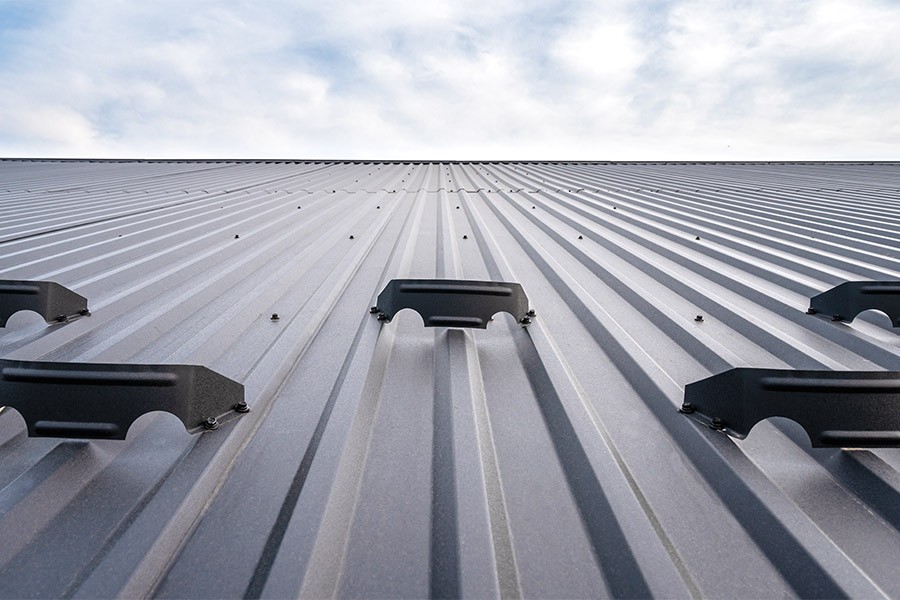If you call Montana your home, you’ve seen how important it is to have residential and commercial buildings that can withstand the icy elements. Roofs can collapse under heavy snowfall or lose shingles, letting frigid air into our cozy homes. Since cold weather and snow can appear when you least expect them, having a roof that can handle winter conditions is crucial. This begs the question: are metal roofs good for snow?
The easy answer is “yes!” But we know it’s important to know “why” and “how” so you can make informed decisions for your residential and commercial properties. If you’re curious about how metal roofing stands up to the colder elements, we’ve got you covered. Our experts have compiled a comprehensive list of FAQs that explain how metal roofs perform in cold climates. Explore our list below as we delve into the benefits of metal roofs in snowy conditions, how they compare to shingles in the cold, and their snow-shedding capabilities.
Metal Roofing and Cold Weather FAQS
Q: Are metal roofs good for snow?
A: In a word, yes! Metal roofs are excellent for snowy climates, especially Montana. Metal roofs offer several benefits when facing winter weather. The top benefit is their inherent ability to resist the snow. The slickness of metal panels lets snow slide off easily, preventing excess snow accumulation. Metal roofs can also contribute to energy efficiency in the winter. Depending on your chosen roof design, having a metal roof can provide extra insulation. This helps keep your home warm and toasty while lowering your monthly energy bill. Bonus, metal roofs are famous for their durability and longevity. They can withstand harsh winter conditions without fear of deterioration or replacement.
Learn more about the benefits of having a metal roof in a snowy climate here.
Q: How do shingles compare to metal roofs in the snow?
A: Metal roofs outstrip asphalt shingles in cold, snowy weather conditions. Shingles are more vulnerable to the elements than metal panels, as they can turn brittle, crack, and expose the underlying building structure to the cold. Additionally, shingles have a shortened lifespan, need lengthy maintenance, and do not effectively handle snow buildup.
In comparison, metal panels are renowned for their durability, especially in harsh weather conditions. Metal roofs keep their structural integrity when faced with snow, hail, rain, and strong winds, and they need to be replaced far less than shingles. Metal panels also shed snow exceptionally well, as their naturally slick surfaces allow snow to slide off more easily than shingles.
Learn more about metal roofs vs shingles in cold climates here.
Q: Do metal roofs help retain heat in the winter?
A: Yes, they do! Metal roofs have a low thermal conductivity, meaning they conduct less heat than asphalt shingles. This quality helps metal panels maintain a warm interior indoors during frigid winters. Also, since metal roofs shed snow and ice efficiently, this can help prevent the buildup of heavy snow loads that can damage your roof and compromise your insulation.
Q: How do metal roofs handle snow loads/snow shedding?
A: Metal roofs handle snow loads and snow shedding very well! Metal roofs are naturally slick, allowing snow to easily glide off. This means that they are less likely to experience large accumulations of snow buildup. The natural slickness of metal roofs can help you avoid shoveling off large amounts of snow by hand.
Q: How do you maintain a metal roof during the winter?
A: To keep your roof clean, optimal, and safe, here are three metal roof maintenance tips for the winter:
- Clean Your Gutters – The buildup of leaves and dirt in your gutters can damage your roof, so removing any debris is crucial to promote your roof’s longevity.
- Brush Off Extra Snow – Metal roofs do a great job of guiding snow off the roof. But depending on your roof’s shape, snow can gather in tight corners or ridges. Gently sweeping or brushing away extra snow can help keep your roof clean.
- Trim Nearby Branches – Tree limbs or branches constantly rubbing on a metal roof can damage the finish. Clipping your trees can help keep your roof’s surface scratch free.
Q: What are snow breaks?
A: Sometimes called snow guards or snow stops, snow breaks are devices installed on metal roofs to help snow and ice melt off in a slow, organized manner. Snow breaks help increase friction between the snow and the metal roof, helping the snow retain snowpack. This helps the snow flow off a roof in a predictable manner, helping prevent roof avalanches. Some of the top benefits of using snow breaks on a metal roof include protection for pedestrians, defense for surrounding property, and reduction in roof maintenance costs. Learn more about snow breaks and metal roofs here.
Q: Are metal roofs noisy?
A: Despite the common misconception, we’re happy to say metal roofs are not noisy–it’s one of their many benefits! In fact, they can even be quieter than shingles. If you are concerned about unwanted noises, you can add insulation boards and upgrades to the metal panels to further dampen any noise that could come with heavy hail or snowfall. So when the heavy snow starts falling or ice splatters against your roof, metal panels can help protect your home from extra noise pollution.
Have More Questions? Great Northern Metal Company is Here to Help!
If you have more questions about how metal roofs hold up to snow or how they can enhance your building’s value, check out our Frequently Asked Questions or drop us a line. Our Bozeman residential and commercial metal roofing experts have over a decade of industry experience, and we’re always excited to lend a hand and point you in the right direction.
If you’re ready to get started on your next roofing project and would like a quote for materials, contact us here, and we’ll get started scoping out your metal roof.


